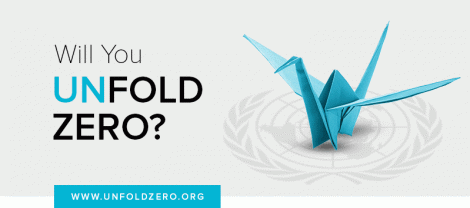Some key international civil society networks, global campaigns and proposals for nuclear abolition
Cover image by Steve Johnson
Note: This short guide focuses on international networks/coalitions, campaigns and proposals. There are numerous national and international organisations that are also doing fantasic work for nuclear abolition. Most of these are members of one or more of the international networks/coalitions such as Abolition 2000, ICAN, Peace and Planet and UNFOLD ZERO. Some are listed at the end of the guide.
Please send any feedback or corrections (in the information listed below) to info@baselpeaceoffice.org).
1. Networks and campaigns
ABOLITION 2000
www.abolition2000.org www.facebook.com/Abolition2000
This global network, established in 1995, seeks to eliminate nuclear weapons. Over 2,000 organizations—including religious groups, environmental organizations, labour groups, peace and disarmament groups—have endorsed the Abolition 2000 call for a nuclear weapons convention (NWC), i.e. a global treaty to prohibit and eliminate nuclear weapons. Abolition 2000 advocates for a NWC at the United Nations, various treaty bodies (such as the Non-Proliferation Treaty conferences), in parliaments and inter-parliamentary associations and amongst civil society. Over 130 countries support the UN resolution for a NWC promoted by Abolition 2000. Abolition 2000 member groups produced a model NWC which has been circulated by the UN Secretary-General as a UN document to guide nuclear disarmament negotiations. Abolition 2000 also campaigns for interim measures including an end to nuclear tests, the establishment of nuclear-weapon-free zones, de-alerting of current nuclear arsenals, affirmation of the illegality of the threat and use of nuclear weapons, the elimination of nuclear deterrence in security doctrines, and promotion of safe, sustainable energy to replace nuclear energy.
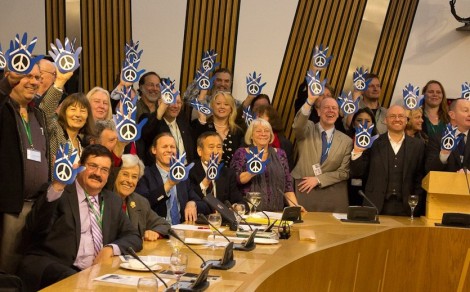
Abolition 2000 Conference held in the Scottish Parliament in 2013
GLOBAL ZERO
www.globalzero.org
Global Zero is an international organization of over 300 political, military, business, civic and faith leaders, backed by a global grassroots campaign, which focuses primarily on steps the nuclear-armed countries could take now to pave the way for the elimination of nuclear weapons by 2030. The global zero plan proposes deep reductions in nuclear arsenals, followed by verification and confidence building-measures, and concluding with negotiations on a global treaty to prohibit and eliminate nuclear weapons. Global Zero produces short education and action videos to share via social media. Global Zero has over 150 student chapters around the world which help organise global actions on reducing nuclear weapons spending, encouraging action at leadership level and general promotion of a nuclear weapon free world. Global Zero established Global Zero Day, a day of actions on April 5, the anniversary of President Obama’s historic Prague speech.
INTERNATIONAL CAMPAIGN TO ABOLISH NUCLEAR WEAPONS
www.icanw.org
Established in 2007, ICAN is a campaign coalition with more than 360 partner organisations in 94 countries. ICAN calls for negotiations on a treaty banning nuclear weapons by committed nations without necessarily waiting for the participation of those armed with nuclear weapons or their allies under nuclear deterrence relationships. ICAN promotes a humanitarian approach to nuclear disarmament and has facilitated civil society participation to the Oslo, Nayarit and Vienna Conferences on the humanitarian impact of nuclear weapons. ICAN has also launched ‘Don’t Bank on the Bomb’ calling on people to have accounts only with banks that don’t invest in corporations manufacturing nuclear weapons systems.
MAYORS FOR PEACE
www.mayorsforpeace.org
www.2020visioncampaign.org
Led by the city of Hiroshima, Mayors for Peace is an international network of cities dedicated to the promotion of peace and the abolition of nuclear weapons. Over 6,000 cities have endorsed the Mayors for Peace 2020 Vision Campaign, a call for the negotiation of a nuclear weapons convention to abolish nuclear weapons by 2020. Mayors for Peace has also launched a ‘Cities are not Targets’ campaign to affirm the illegality of targeting populated areas with weapons of mass destruction or methods of warfare that are indiscriminate.
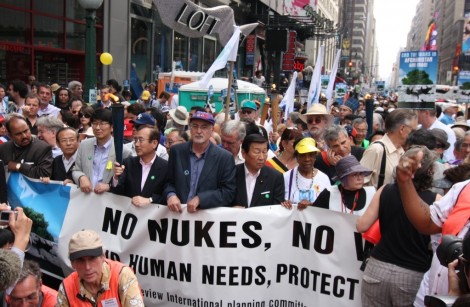
Mayors for Peace leads nuclear abolition rally in New York, 2010
MIDDLE POWERS INITIATIVE
www.middlepowers.org
An international coalition established by eight leading non-governmental organizations to encourage and support middle power countries (countries that are influential with both nuclear-armed States and non-nuclear States) to take strong and effective action in advancing nuclear disarmament. Middle Powers Initiative organizes track two consultations amongst governments with a focus on building the political and legal framework for a nuclear weapon free world.
NGO Committees on Disarmament
In New York, Geneva and Vienna there are committees which are open to all non-governmental organisations active at the United Nations. These are the NGO Committee on Disarmament, Peace and Security (New York), the NGO Committee for Disarmament (Geneva) and the NGO Committee on Peace (Vienna). The committees monitor and report on disarmament meetings and developments at the United Nations, organise events, assist with NGO participation in UN disarmament meetings and liaise between New York, Geneva and Vienna - the three main centres for UN action on nuclear disarmament.
NUCLEAR ABOLITION FORUM
www.abolitionforum.org
A joint project of eight leading disarmament organizations, established to facilitate dialogue between academics, governments, disarmament experts and NGOs on key issues regarding the prohibition and elimination of nuclear weapons, as well as the process to achieving this. Nuclear Abolition Forum produces a journal and organises workshops/forums on key issues, as well as posting relevant articles on its website. Editions of the journal produced to date include: International Humanitarian Law and Nuclear Weapons: Examining the humanitarian approach to nuclear disarmament, and Moving Beyond Nuclear Deterrence to a Nuclear Weapons Free World.
PARLIAMENTARIANS FOR NUCLEAR NON-PROLIFERATION AND DISARMAMENT
www.pnnd.org
Parliamentarians for Nuclear Non-proliferation and Disarmament (PNND) is an international cross-party network of parliamentarians collaborating on initiatives to prevent nuclear proliferation and achieve a nuclear weapon–free world. The network includes many influential policymakers, including current and former heads of government, foreign ministers, and chairs of parliamentary foreign affairs and defense committees. PNND members organise parliamentary debates, appeals/declarations, events and resolutions (see PNND News). PNND actively promotes nuclear disarmament in inter-parliamentary bodies including the Inter Parliamentary Union, NATO Parliamentary Assembly and OSCE Parliamentary Assembly.
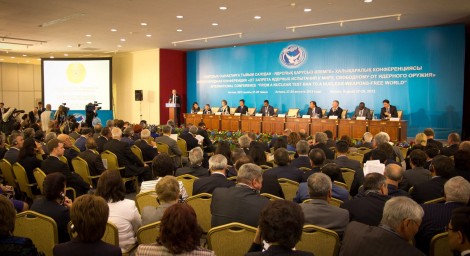
PNND 2012 Annual Assembly in Astana
PEACE AND PLANET: Mobilization for a Nuclear-Free, Peaceful, Just, and Sustainable World
www.peaceandplanet.org
Peace and Planet is a global coalition of peace, disarmament, human rights, environment, development and social justice organisations focused on the abolition of nuclear weapons. Peace and Planet was established in 2014 with an initial focus on the 2015 NPT Review Conference. Peace and Planet organised the civil society rally and march just before the Review Conference, as well as actions around the world (Global Wave 2015) and advocacy at the NPT conference for the start of negotiations to prohibit and eliminate nuclear weapons. Peace and Planet works with UNFOLD ZERO to promote UN initiatives to abolish nuclear weapons.
UNFOLD ZERO
www.unfoldzero.org
UNFOLD ZERO is a platform for United Nations (UN) focused initiatives and actions for the achievement of a nuclear weapons free world. UNFOLD ZERO aims to unfold the path to zero nuclear weapons through effective steps and measures facilitated by the UN General Assembly, UN Security Council, UN Secretary-General and other UN bodies. UNFOLD ZERO was established by PragueVision, PNND, Basel Peace Office, Mayors for Peace 2020 Vision Campaign and Aotearoa Lawyers for Peace, in cooperation with the NGO Committee on Disarmament and the UN Office of Disarmament Affairs. UNFOLD Zero coordinated parliamentary, UN (Geneva) and civil society commemoration of the first International Day for the Total Elimination of Nuclear Weapons on September 26, 2014, and the second commemoration of the day on September 26, 2015.
2. Proposals
The most important factor in moving to a nuclear weapon free world is to elevate the political will and commitment to achieving this goal. There are numerous initiatives focusing on this. However, what is also necessary to consider is what would be the best approach for governments to negotiate the legal framework to achieve a nuclear-weapon-free world?
The following are some of the main proposals which have been raised by governments and civil society. They have been proposed in a number of international forums (UN General Assembly, NPT Review Conferences and the Conference on Disarmament) and discussed in the UN Open Ended Working Group on Taking Forward Multilateral Nuclear Disarmament Negotiations .
Nuclear Weapons Convention (NWC). A global treaty which would prohibit the use, threat of use, possession, development, testing and transfer of nuclear weapons and which would provide for their elimination under effective verification. The NWC would be similar to the Biological Weapons Convention and Chemical Weapons Convention which prohibit these weapons globally. A Model NWC, drafted by disarmament experts, outlines the legal, technical and institutional measures that would be required to prohibit and eliminate the weapons.
Proponents of a NWC accept that the treaty does not necessarily have to be negotiated in one step, but could be negotiated as a package of agreements, some being able to be concluded sooner than others. This could, for example, include an agreement on prohibition on use, followed by agreements on elimination of the stockpiles and verification measures. The UN resolution proposing a NWC is supported by over 130 countries including some nuclear-armed States. The Model NWC and discussions on how a NWC could be achieved are included in 'Securing our Survival: The Case for a Nuclear Weapons Convention', published by the International Physicians for the Prevention of Nuclear War.
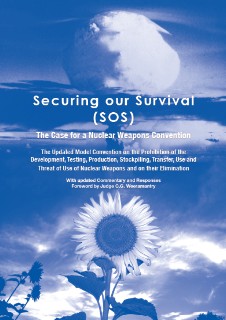
Securing our Survival: The Case for a NWC
UN Secretary-General’s Five-Point Proposal. The UN Secretary General released a Five-Point Proposal in 2008 which calls for the commencement of negotiations on a nuclear weapons convention or package of agreements, accompanied by simultaneous work on other measures including establishment of nuclear weapon free zones, comprehensive prohibitions on nuclear testing and fissile material production, commitments not to use nuclear weapons against non-nuclear States, a Security Council Summit on prohibiting nuclear weapons, and increased efforts to eliminate all weapons of mass destruction and control other weapons systems.
The UNSG’s proposal has been supported by the 164 member parliaments of the Inter Parliamentary Union. The States Parties to the nuclear Non-Proliferation Treaty have called for all States to make special efforts to build the framework for a nuclear weapon free world guided by the UNSG’s proposal including for negotiations on a NWC or package of agreements.
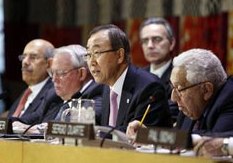
Ban Ki-moon presents his 5-point proposal to the UN
Prohibition on use followed by elimination. India has proposed negotiations on a convention prohibiting the use of nuclear weapons as a step toward the conclusion of a nuclear weapons convention. Their UN resolution on this proposal is supported by over 125 countries. Support for this could grow from other countries (including some of the other nuclear-armed States and allies) if they followed the chemical weapons prohibition model, i.e. the Geneva Gas Protocol of 1925 banned the use of chemical weapons but not the possession. Thus many possessors were able to join. The treaty to ban possession (Chemical Weapons Convention) came later.
Ban treaty. This would be a treaty on the prohibition of nuclear weapons use and possession that could be negotiated and concluded without necessarily waiting for the nuclear-armed States or those under extended nuclear deterrence doctrines to join. The treaty itself would only be applicable to those States that join. However, the process could build political momentum and pressure on other States to take more significant steps toward nuclear disarmament. The ban treaty is being promoted by some civil society organisations including ICAN. As yet there is no formal proposal for it from any governments, although it is discussed in a recent working paper by the New Agenda Coalition – along with the proposals for a NWC and framework agreement.
Step-by-step. This approach, favoured by France, Russia, UK and the USA (and most of the NATO allies) calls for the achievement of minimal nuclear weapons control measures (stockpile reductions, nuclear test ban, ban on production of fissile materials) before moving to more comprehensive disarmament steps. Prohibitions on the use of nuclear weapons and on their possession would not be considered until after other steps have been achieved.
Building Blocks. The Building Block approach, put forward by a group of middle power countries (including some NATO members and Japan) is a slight advance on the step-by-step approach. It focuses on some of the same steps, but emphasises that work should be done on these simultaneously. In addition, it recognises that a nuclear weapons convention or package of agreements will be required as the final building block, and that some preparatory work could be done to explore this.
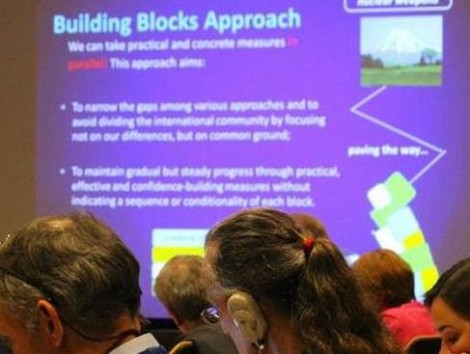
Japanese government explaining the Building Blocks approach at the UN in Oct 2014
Framework agreement. This would be an agreement by nuclear-armed States and non-nuclear States setting forth the obligation of non-use of nuclear weapons and a schedule for their elimination, and providing for further negotiations on matters that could not be settled at the outset, for example verification, enforcement, and control and disposition of fissile materials.
Further reading:
- Creating the Conditions and Building the Framework for a Nuclear Weapons-Free World, MPI briefing paper.
- New Agenda Coalition Working Paper to the NPT on implementation of Article VI.
- Bridging the gaps - building the framework - ensuring success, NGO working paper to the UN Open Ended Working Group.
- The Road to Nuclear Disarmament, by IALANA
- Ban nuclear weapons now. ICAN
Notes:
- This is a short list that, due to space constraints, does not include all of the international nuclear abolition campaigns, nor all the international professional organisations focused on nuclear abolition or wider peace networks. Other campaigns include the ATOM Project, Gensuikyo signature campaign, and the Arms Down Campaign. international professional organisations include Pugwash (scientists), IALANA (lawyers) and IPPNW (medical professionals). There are also religious networks active on nuclear abolition such as Religions for Peace, the United Religions Initiative, World Conference of Churches, Pax Christi and Soka Gakkai International. And there are more general international peace/disarmament networks/organisations such as Beyond War, Global Security Institute, International Peace Bureau, Peace Boat, World Future Council, War Resisters League, and Women’s International League for Peace and Freedom. There are aso a number of national or regional campaigns/networks such as the Campaign for a Nuclear Weapon Free World, United for Peace and Justice, and the Campaign for Nuclear Disarmament. Most of these are members of the main international networks outlined in this guide.
- This summary is prepared by the Basel Peace Office, a joint project of four swiss organisations (IPPNW Switzerland, swisspeace, Basel Canton and the Basel University Sociology Department) and four international organisations (Global Security Institute, PNND, Middle Powers Initiative and World Future Council). Basel Peace Office is active in most of the listed networks/campaigns. The Basel Peace Office supports a multi-faceted approach to nuclear disarmament. As such, the proposals and efforts listed in this guide are in our view commendable, advance the elimination of nuclear weapons and can be pursued simultaneously in a mutually supporting manner. Feedback to info@baselpeaceoffice.org. For more information see www.baselpeaceoffice.org.

